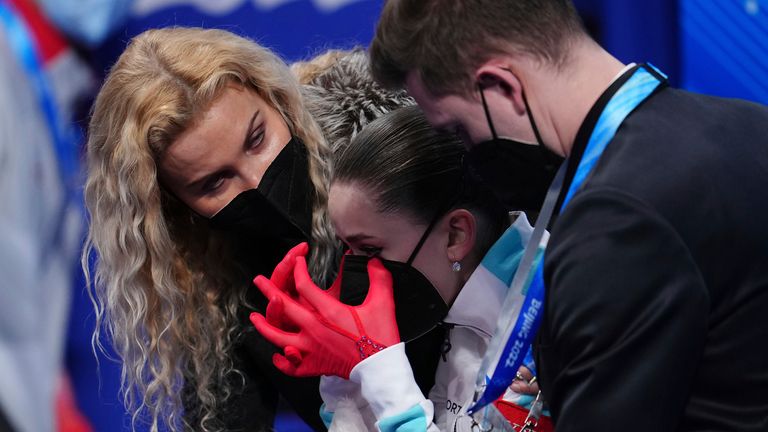Kamila Valieva: Russian figure skater falls and finishes fourth at Winter Olympics
The 15-year-old, who failed a drugs test, looked distraught after falling in her free skate and her score of 224.09 was only enough to take fourth place; her compatriot Anna Shcherbakova finished first and secured the gold medal;
Thursday 10 March 2022 17:12, UK
Kamila Valieva fell during her free skate and finished the women's figure skating competition in fourth place.
The Russian figure skater,15, tested positive for the banned heart medication trimetazidine on Christmas Day and investigations are ongoing regarding the case.
Valieva found out on Monday she would be able to compete in the women's competition following a decision from the Court of Arbitration for Sport (CAS).
The CAS cited "exceptional circumstances" for its decision. They included Valieva's status as a "protected person" under the World Anti-Doping Code, "serious issues" in the process of notifying Valieva of her result, and the fact a suspension could cause her "irreparable harm".
The 15-year-old performed a strong short program on Tuesday, which saw her qualify in first place for the final part of the competition - the free skate.
She then skated to 'Bolero by Maurice Ravel' in her free skate, however, was not able to perform a clean routine. Instead, Valieva fell on one jump and was forced to put her hands down on the ice while trying to land two others.
Valieva finished with a total score of 224.09. Her compatriot Anna Shcherbakova won the gold medal, fellow Russian Alexandra Trusova secured silver and Japan's Kaori Sakamoto bronze.
Prior to her final skate, a spokesman for International Olympic Committee (IOC), said the results would have been 'preliminary' and have had an 'asterisk' next to them if Valieva finished within the top three.
There would not have been a medal ceremony, as has been the case for the team event due to Valieva being part of the Russian Olympic Committee's first-place finish.
A number of athletes and former athletes, including direct rivals of Valieva, had questioned her right to remain in the competition or the perceived unfairness of allowing her to compete in spite of her positive sample.
'One of the most uncomfortable moments in sport'
Sky Sports' Geraint Hughes spoke after Valieva's final skate and questioned the duty of care shown towards the 15-year-old skater.
"From the IOC's point of view, they get a medal ceremony because Kamila Valieva finished outside of the medals, he said. "However, the 15-year-old was in floods of tears at the end.
"Up until everything that has happened in the course of the last week, she'd probably been the red-hot favourite. She's a consummate skater but clearly what has gone on over the last week was too much for her.
"The question that has to be asked is what on earth she was doing on the ice in the first place? She has failed a doping test. Yes, there has been a legal challenge, so you have to go by the process of law.
"The Court of Arbitration for Sport (CAS) is the highest court in the land when it comes to sport but seriously, the duty of care of a 15-year-old being exposed to this on the highest stage of all? Goodness knows mentally, psychologically how she is going to feel.
"She couldn't contain herself at the end and has to sit in a box waiting for the judges' results. She physically couldn't control herself, with her coaches around her who are currently being investigated over their part in her failed doping test.
"It's one of the most uncomfortable moments in sport you're likely to see. It all looks and feels like how the pinnacle of sport should not be played out.
"There are some uncomfortable questions for the IOC, CAS and for the Russian Olympic Committee to try and answer about what on earth has gone on in Beijing. Why on earth has this been allowed to happen?"




